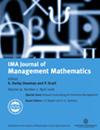Model-based adjustment for conditional benchmarking
IF 4.3
3区 工程技术
Q3 MANAGEMENT
引用次数: 1
Abstract
Quantitative benchmarking is widely used in the industry to compare relative performance across a sample of organizations. A key analytical challenge lies in obtaining accurate measures of intrinsic organizational performance net of contextual or exogenous influences. In this paper, we propose a model-based adjustment approach for comparative benchmarking that allows the analyst to recover targeted metrics for specific aspects of innate performance. We outline the statistical theory underpinning our method, provide simulations to demonstrate its properties and describe practical examples for computation. The managerial relevance of the method is demonstrated via two real-world transport industry applications: adjusting for economies of scale and density in benchmarking average costs of urban metros and for service characteristics in benchmarking metro journey times.基于模型的条件基准调整
定量基准测试在行业中被广泛用于比较组织样本的相对绩效。一个关键的分析挑战在于在不受上下文或外部影响的情况下获得内部组织绩效的准确衡量标准。在本文中,我们提出了一种基于模型的比较基准调整方法,该方法允许分析师恢复固有性能特定方面的目标指标。我们概述了支撑我们方法的统计理论,提供了模拟来证明其性质,并描述了实际计算示例。该方法的管理相关性通过两个真实世界的交通行业应用得到了证明:在基准城市地铁平均成本中调整规模经济和密度,在基准地铁行程时间中调整服务特征。
本文章由计算机程序翻译,如有差异,请以英文原文为准。
求助全文
约1分钟内获得全文
求助全文
来源期刊

IMA Journal of Management Mathematics
OPERATIONS RESEARCH & MANAGEMENT SCIENCE-MATHEMATICS, INTERDISCIPLINARY APPLICATIONS
CiteScore
4.70
自引率
17.60%
发文量
15
审稿时长
>12 weeks
期刊介绍:
The mission of this quarterly journal is to publish mathematical research of the highest quality, impact and relevance that can be directly utilised or have demonstrable potential to be employed by managers in profit, not-for-profit, third party and governmental/public organisations to improve their practices. Thus the research must be quantitative and of the highest quality if it is to be published in the journal. Furthermore, the outcome of the research must be ultimately useful for managers. The journal also publishes novel meta-analyses of the literature, reviews of the "state-of-the art" in a manner that provides new insight, and genuine applications of mathematics to real-world problems in the form of case studies. The journal welcomes papers dealing with topics in Operational Research and Management Science, Operations Management, Decision Sciences, Transportation Science, Marketing Science, Analytics, and Financial and Risk Modelling.
 求助内容:
求助内容: 应助结果提醒方式:
应助结果提醒方式:


